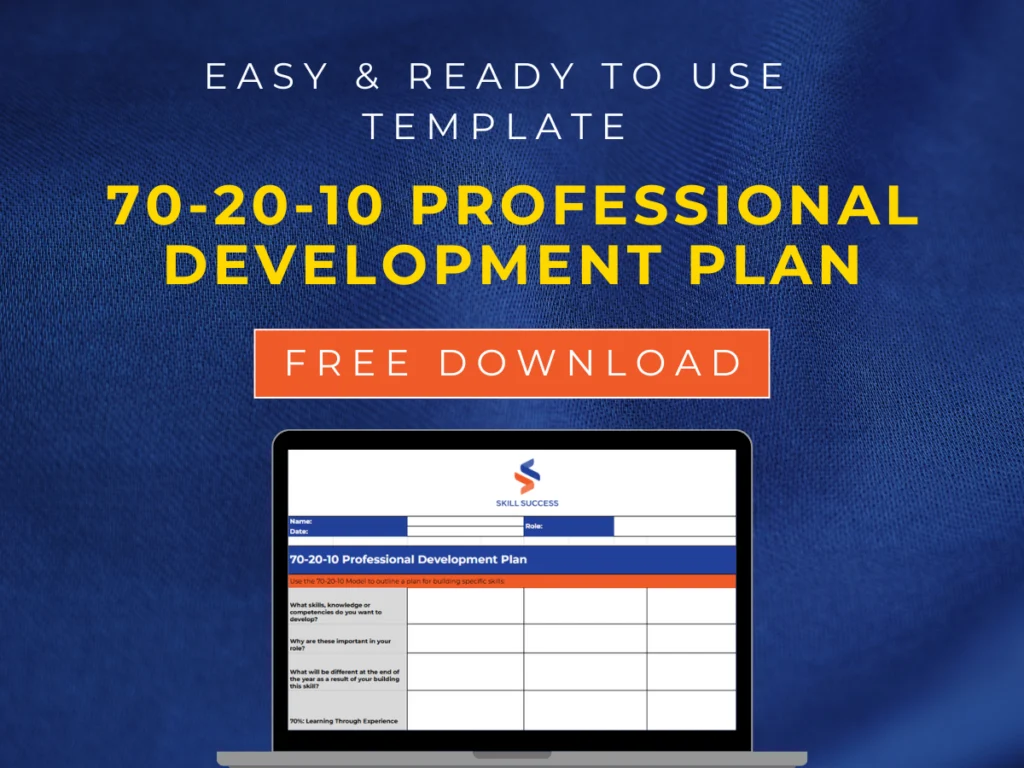Professional development often falls into the trap of being a one-size-fits-all approach. Many organizations invest in training programs based on industry trends, assuming that what is popular is what employees need. However, this assumption can lead to ineffective learning experiences. How often have you seen employees leave a workshop feeling disengaged because the content was irrelevant to their roles? As a previous instructor, I have seen course evaluations where participants openly questioned the necessity of the training, pointing out that the session did not align with their daily challenges.
To ensure meaningful learning, organizations must be strategic. The 70-20-10 learning model provides a structured approach to skill development by balancing experience, social learning, and formal training. Our 70-20-10 Learning Model Template helps you apply this framework effectively, making it easier to design a well-rounded learning strategy.
What is the 70-20-10 Learning Model?
The 70-20-10 learning model is a framework that emphasizes different sources of learning:
- 70% experience: Learning through hands-on experiences and job-related tasks.
- 20% exposure: Learning through interactions with peers, mentors, and feedback.
- 10% education: Learning through formal training, courses, or certifications.
This model was developed by Morgan McCall, Robert Eichinger, and Michael Lombardo at the Center for Creative Leadership. Their research found that successful leaders developed most of their skills through practical experiences rather than classroom instruction alone.
Using the 70-20-10 learning model, employees and managers can create a structured development plan that aligns with professional goals. Below is a step-by-step guide to implementing this approach.
Step 1: Identify skills for development
Before diving into activities, define what skills, knowledge, or competencies you need to develop. Ask yourself:
- What skills will enhance performance in my current role?
- How will these skills impact my growth and career progression?
- What changes do I expect after developing these skills?
For example, a manager may want to improve leadership skills to handle team dynamics more effectively.
Step 2: Implement the 70% learning through experience
Since 70% of learning happens through experience, identify on-the-job activities that align with skill development. Examples include:
- Taking on a new project with greater responsibilities.
- Participating in cross-functional initiatives.
- Shadowing a colleague with expertise in the desired skill.
- Leading a team for a small project to build leadership capabilities.
Example: If you want to develop strategic thinking, volunteer to assist in planning an upcoming company-wide initiative.
Step 3: Leverage the 20% learning through others
Interpersonal learning accounts for 20% of development. Seek guidance from others through:
- Mentoring: Connect with a mentor who excels in the skill you want to develop.
- Peer learning: Engage in peer coaching or knowledge-sharing sessions.
- Feedback: Regularly request feedback from supervisors, teammates, and direct reports.
- Networking: Join professional groups and industry events to exchange insights.
Example: A manager looking to improve coaching skills can schedule bi-weekly feedback sessions with employees and seek advice from a senior leader.
Step 4: Complete the 10% learning through formal training
Only 10% of learning comes from structured education, but it remains essential. Options include:
- Attending workshops, seminars, or online courses.
- Completing a relevant certification.
- Participating in industry conferences.
- Engaging in self-paced learning through books, podcasts, or webinars.
Example: A sales professional aiming to refine negotiation skills might enroll in a negotiation tactics course or attend a workshop on closing deals.

Creating an Action Plan
A well-defined action plan helps track development, maintain motivation, and align learning with organizational goals.
To create an effective action plan:
- Identify key learning objectives: Clearly state what you want to achieve and why it matters to your role.
- Set realistic timelines: Assign deadlines to each learning activity to maintain momentum and ensure steady progress.
- Determine success metrics: Establish measurable indicators of success, such as completing a project, receiving positive feedback, or mastering a new skill.
- Allocate resources: Identify necessary tools, mentors, or training materials to support your development journey.
- Monitor and adjust: Regularly review progress, reflect on challenges, and make necessary modifications to stay on track.
Key Insights
The 70-20-10 learning model provides a structured yet flexible approach to professional growth. By prioritizing on-the-job experience, leveraging mentorship and feedback, and supplementing with formal training, employees can develop skills in a practical and meaningful way.
Instead of adopting a one-size-fits-all approach to learning, organizations should tailor development programs to individual needs. With a clear action plan, employees can measure progress, enhance their careers, and contribute effectively to their teams.
Now, take the first step: What skill do you want to develop this year?
Download the 70-20-10 Learning Plan Template to start building your professional development plan today.
Watch a free demo for Skill Success Teams and unlock access to over 4,000 expert-led courses, coaching, and professional development tools to accelerate your growth!
DOWNLOAD NOW